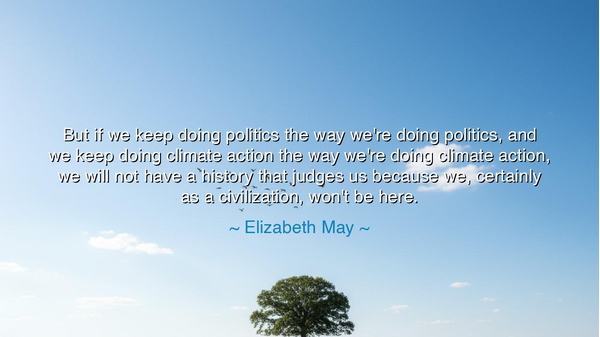
But if we keep doing politics the way we're doing politics, and
But if we keep doing politics the way we're doing politics, and we keep doing climate action the way we're doing climate action, we will not have a history that judges us because we, certainly as a civilization, won't be here.






“But if we keep doing politics the way we're doing politics, and we keep doing climate action the way we're doing climate action, we will not have a history that judges us because we, certainly as a civilization, won't be here.” So spoke Elizabeth May, a voice crying out in the storm of our own making. Her words are not merely a warning—they are a lament for the blindness of our age and a prophecy for the generations to come. She speaks as one who sees the gathering clouds of ruin, as one who knows that inaction is not neutrality, and that delay is the quiet hand of destruction itself. These are not words of despair, but of fierce love—for the earth, for life, and for the fragile promise of tomorrow.
In the old days, when empires rose upon the bones of forests and rivers ran red with industry, humanity believed itself invincible. We called it progress, and we crowned ourselves as masters of nature. But in truth, we were children playing with fire, ignorant of the kindling beneath our feet. May’s words strike at this ancient folly. She reminds us that politics, as we have practiced it, is too small for the scale of our peril. It quarrels over fragments while the foundation burns. And climate action, as we have attempted it, is too timid for the rage of the storm. We draft resolutions while glaciers weep into the sea. We sign accords while the earth, our mother, trembles beneath the fever of our own making.
There was once a time, not long ago, when the river Cuyahoga in Ohio caught fire. Flames rose from the waters themselves—a symbol of what happens when greed outweighs wisdom. And yet from that burning river was born the Clean Water Act, a moment when humankind remembered that the price of neglect is destruction. So too, today, must we awaken. May’s warning is the modern echo of that fire. She cries not only for rivers and skies but for civilization itself—for if we continue as we are, history will not judge us, for there will be no historians left to write our story.
Let us not mistake her tone for hopelessness. There is in her voice the courage of the ancients—the spirit of Cassandra, who foresaw the fall of Troy, yet spoke even as the city burned. To heed May’s call is to remember that the future is not yet lost. But we must choose differently. We must raise our politics from a theater of division to a council of survival. We must cast aside the illusion that nature is our servant, and once more become her stewards. For every tree that falls, every ocean that acidifies, is a decision we make as surely as any law or policy.
Look to the story of Wangari Maathai, the woman who planted trees across Kenya while governments dismissed her as a dreamer. Alone at first, she placed one seed after another into the ground, and from her defiance grew millions of trees and the birth of a movement. That is true climate action—rooted in persistence, watered by faith, and grown through unity. From one woman’s decision came the breath of a continent reborn. May’s words urge us toward the same awakening: to see that salvation will not come from speeches or slogans, but from action, courageous and relentless.
The lesson is clear, children of the earth: change the way we live, or we will not live at all. The age of half-measures is over. We can no longer pray for rescue while our hands remain idle. Let us build new politics, guided by the flame of responsibility, not the shadow of ambition. Let us speak for the voiceless earth with the urgency of one who speaks for their own life—for indeed, we are one and the same.
And so, take this teaching into your days: live as guardians, not as conquerors. Choose simplicity over excess, cooperation over conquest, stewardship over indifference. Vote for those who serve the planet, not those who serve power. Plant trees, restore waters, cherish the small and the living. For in doing so, you honor the covenant of survival itself.
If we heed the call of Elizabeth May, then perhaps, in centuries yet unborn, our descendants will speak of us not as those who perished in arrogance, but as those who turned back from the brink and reclaimed the earth. Let them say that we were the generation who remembered what it meant to be human—not destroyers, but caretakers of the only home we shall ever know.






AAdministratorAdministrator
Welcome, honored guests. Please leave a comment, we will respond soon